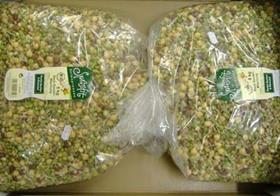
Beansprouts produced on an organic farm located between Hamburg and Hanover have been identified as the likely source of what is now being referred to as Europe's worst outbreak of E.coli contamination in modern history.
Agricultural officials in the Lower Saxony region of northern Germany told reporters that the farm, which has now been closed, was the source of beansprouts consumed by a number of people suffering from E.coli infection across the country.
The owners of the farm itself, Gärtnerhof Bienenbüttel in the district of ülzen, said they were 'shocked and concerned' by the news that some of their products had apparently been contaminated with the E.coli bacteria involved in the outbreak.
'Following the announcement by the authorities, we have immediately informed all of our customers and recalled the product,' the group said.
A number of different varieties of beansprout are produced at Gärtnerhof Bienenbüttel and are marketed under the Sprossfit brand.
In a statement, the owners added: 'We have produced sprouts for 25 years and have always been able to deliver perfect goods.
'In January 2011, we sampled routinely for E.coli and the results were negative. In the second half of May, we tested more sprouts on the basis of the current situation and the laboratory results were also negative.'
But with test results expected to confirm the presence of E.coli bacteria in products from Gärtnerhof Bienenbüttel on Monday, 6 June, Lower Saxony's agriculture minister Gert Lindemann said it would be wise to avoid eating any kind of beansprout until further notice.
In the meantime, an earlier advisory issued by the German government urging consumers not to eat cucumbers, tomatoes and lettuce remained in place, while Russia's ban on all vegetable imports from the European Union – imposed on 2 June – was also yet to be lifted.
Given the earlier mistake made in pointing to Spanish cucumbers as the possible source, a presumption later proven to be incorrect, it also remained unclear whether or not the beansprout production site was the sole source of the contamination.
Although the outbreak has been largely confined to northern Germany, it has caused the deaths of at least 18 people and led to more than 2,000 people across Europe suffering from a range of symptoms, from diarrhoea to haemolytic uraemic syndrome, which severely affects the kidneys.
Meanwhile, the damage to Europe's fresh vegetable trade is likely to be huge, both in monetary terms and in the context of its reputation among the general public.
In 2010, the EU shipped around 1.14m tonnes of vegetables worth almost €600m to Russia, the sector's largest external trading partner.
The EU's leading players in terms of vegetables sold on the Russian market last year were: the Netherlands which shipped more than half a million tonnes of product worth over €190m, Poland (215,000 tonnes worth €120m) and Lithuania (151,000 tonnes worth €158m).



